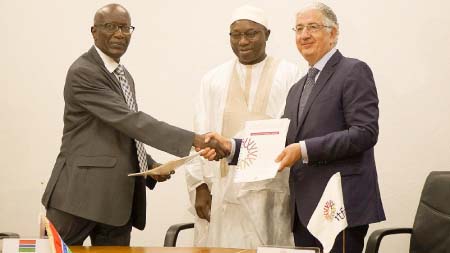
Press
Release
The
International Islamic Trade Finance Corporation (ITFC), a member of the Islamic
Development Bank (IsDB) Group, has signed a three new Murabaha Financing
Agreements with The Gambia for a total financing amount up to US$ 55million to
support the strategic key sectors of Agriculture and Energy, in line with the
three-year Framework agreement of $210 Million signed in January 2018 between
the two parties. These new agreements will help the government secure the
country’s imports of refined petroleum products and electricity generation
under two operations with NAWEC and GNPC as executing agents of respectively
$25M and $10M, the third agreement of $20M will support the upcoming Groundnut
marketing season 2019-2020.
Since
its inception in 2008, ITFC approved a total of US$544 million for the Republic
of The Gambia under 35 operations. Approximately 68% of the approved financing
went to the Energy sector for the importation of petroleum products and 32% to
the Agricultural sector as pre-export financing of the country’s primary export
commodity - Groundnuts.
These
three new Agreements was signed on 7th November by ITFC’s CEO Eng Hani Salem
Sonbol and The Gambia, represented by the H.E. Mambury Njie, Minister of
Finance and Economic Affairs, on the sidelines of the Arab Africa Trade Bridge
(AATB) Governing Board Meeting held in Dakar Senegal from the 6th – 8th of
November 2019.
The
signing of these three agreements is reflective of ITFC’s strong relationship
with The Gambia, and is in support of the country’s strategic objective to
build on those keys sectors under the new Gambia National Development Plan
2018-2020..
In
his remarks regarding the signing of the agreement, Eng. Hani Salem Sonbol,
ITFC CEO, said, “The signing of these new Agreements emphasizes our commitment
to enhance our close cooperation and a strategic partnership with The Gambia
for the economic empowerment of its population.” He added that, “Our continued
partnership under the new Framework Agreement is symbolic of our focus to
continue to contribute towards the wellbeing of The Gambia through our
investment in keys sectors of energy and agriculture.”
The
Gambian Minister for of Finance and Economic Affairs also expressed his delight
with the signing of these three new Agreements with ITFC. He also indicated his
optimism for continued partnership with ITFC towards the development of key
sectors in The Gambia’s agriculture and energy sectors.
Through
these new agreements, ITFC will support the financing of key economic sectors
for The Gambia including energy through the importation of refined petroleum
products, and agriculture, through the importation of fertilizers and the
provision of pre-export financing for agricultural produce notably, groundnuts
and cashew nuts.
The
International Islamic Trade Finance Corporation (ITFC) is a member of the
Islamic
Development
Bank (IsDB) Group. It was established with the purpose of advancing trade among
OIC member countries, which would ultimately contribute to the overarching goal
of improving socioeconomic conditions of the people across the world. Commenced
operations in January 2008, ITFC has since consolidated all trade finance
businesses that used to be handled by various windows within the IsDB Group.
Earning the A1 rating by Moody’s reflects the Corporation’s efficiency in
service delivery by responding swiftly to customer needs in a market-driven
business environment.
Since
2008, ITFC has provided more than US$45 billion of trade financing to OIC
Member Countries, making the Corporation the leading provider of trade
solutions for OIC Member Countries’ needs. With a mission of being a catalyst
for trade development among OIC Member Countries and beyond, the Corporation
helps entities in Member Countries gain better access to trade finance and
provides them with the necessary trade-related capacity building tools, which
would enable them to successfully compete in the global market.


